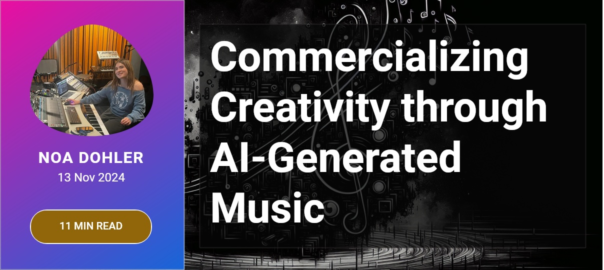AI Music Tech revolutionizes creativity beyond human limitations.
The creative landscape is undergoing a seismic shift. While some musicians fear AI’s encroachment, others embrace its boundless potential. As explored in our analysis of AI music in film and gaming, this technology isn’t just an assistant—it’s becoming a collaborative partner in artistic expression.
At a recent performance, I integrated AI-generated harmonies with my piano composition. The audience couldn’t distinguish between human and machine-created elements. This moment crystallized my belief that AI Music Tech isn’t replacing creativity—it’s amplifying it.
Unlocking Creativity with AI Music Tech
The creative potential of AI in music has reached unprecedented heights, with the global generative AI music market valued at $440.0 million in 2023. This technological revolution enables businesses to produce unique musical pieces at scale, breaking traditional creative boundaries.
Through sophisticated algorithms, AI Music Tech tools can analyze vast libraries of compositions, learning patterns and structures that inform new creations. This capability allows for rapid experimentation and iteration, producing countless variations of musical pieces in minutes rather than months.
Companies can now customize soundscapes for specific target audiences, optimizing emotional impact and brand alignment. This efficiency in music creation has transformed how businesses approach their audio branding strategies, making professional-grade music production accessible to organizations of all sizes.
Crafting Unique Auditory Branding Through AI
The revolution in auditory branding has been supercharged by AI Music Tech, with industry experts predicting unprecedented growth in AI-driven music creation. Companies are leveraging these tools to develop distinctive sound signatures that resonate with their brand identity.
AI algorithms analyze consumer responses and engagement patterns, enabling brands to fine-tune their audio elements for maximum impact. This data-driven approach ensures that every musical element aligns perfectly with brand values and target audience preferences.
The technology enables real-time adaptation of music based on customer interaction, creating dynamic soundscapes that evolve with consumer behavior. This level of personalization was previously impossible with traditional music production methods.
Commercial Applications of AI Music Tech
The commercial impact of AI Music Tech extends far beyond basic background music. According to industry analysis, businesses are increasingly integrating AI-generated music into their customer experience strategies.
Retail environments are being transformed through adaptive soundscapes that respond to foot traffic patterns and shopping behaviors. Gaming companies utilize AI to create dynamic scores that evolve based on player actions, enhancing immersion and engagement.
Interactive installations in public spaces leverage AI Music Tech to create unique, responsive audio environments. These applications demonstrate how AI is revolutionizing the way businesses approach sound design and customer engagement.
Future Trajectories of AI Music Tech
The future of AI Music Tech is expanding rapidly, with projections indicating a market value of $38.7 billion by 2033. This growth reflects the increasing sophistication of AI algorithms and their ability to generate increasingly complex and nuanced musical compositions.
Emerging trends suggest a future where AI Music Tech will enable real-time collaboration between human musicians and AI systems. This symbiotic relationship will push the boundaries of creative expression while maintaining the human element in music creation.
The technology’s evolution will likely lead to new business models and revenue streams in the music industry. Companies that adapt to and embrace these changes will be better positioned to capitalize on the transformative potential of AI in music.
Innovation Opportunities in AI Music Tech
Startups could develop AI-powered music licensing platforms that automatically generate and license custom music for content creators. This would streamline the often complex process of music licensing while ensuring fair compensation for rights holders.
Large corporations might invest in developing AI Music Tech systems that create personalized shopping soundtracks based on individual customer preferences and shopping history. This could significantly enhance the retail experience and increase customer engagement.
There’s also potential for developing AI-driven music therapy applications that generate therapeutic soundscapes based on biometric data. This could revolutionize mental health treatment and wellness programs while creating new revenue streams in healthcare.
Embrace the Symphony of Innovation
The convergence of AI and music technology opens doors to unprecedented creative and commercial possibilities. Whether you’re a business leader, artist, or technology enthusiast, now is the time to explore how AI Music Tech can enhance your projects. What innovative ways will you use AI to create your unique sonic signature?
Essential FAQ About AI Music Tech
Q: How much is the AI music technology market worth?
A: The global AI music market is valued at $440.0 million in 2023 and is projected to reach $38.7 billion by 2033.
Q: Can AI Music Tech create original compositions?
A: Yes, AI can generate unique musical compositions using advanced algorithms, though typically works best in collaboration with human creators.
Q: Is AI-generated music copyright protected?
A: Music generated entirely by AI cannot be copyrighted, but human-AI collaborations may qualify for copyright protection.
